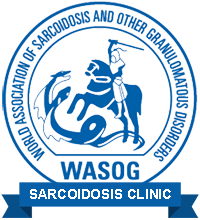Gene polymorphisms of ACE and the angiotensin receptor AT2R1 influence serum ACE levels in sarcoidosis
Keywords:
angiotensin-converting enzyme, Angiotensin II type 1 receptor, sarcoidosis, gene polymorphismAbstract
Angiotensin converting enzyme (ACE) is thought to influence susceptibility, disease progression, and/or outcome of sarcoidosis by functional mutations/polymorphisms of the ACE gene, such as the ACE gene deletion/insertion (D/I) polymorphism or the angiotensin receptors like the angiotensin II receptor type 1 (AT2R1) A1166®C polymorphism. The aim of our study was to examine the distribution of the ACE D/I genotypes and the AT2R1 A1166®C genotypes in sarcoidosis and healthy controls, and to test their influence on disease progression. In this study, we assessed ACE and AT2R1 genotypes by PCR in 264 healthy Caucasians and 95 sarcoidosis patients. Serum ACE levels were determined using a kinetic test. Genotyping sarcoidosis patients for the AT2R1 A1166®C polymorphism revealed an increase in homozygous genotypes CC (sarcoidosis: 11.6%, controls: 9.2%) and AA (sarcoidosis: 61.1%, controls: 47.3 %) but a lower frequency in heterozygous genotypes (sarcoidosis: 27,4%, controls: 43,5%; p=0.024) which was more pronounced in male patients. The co-incidence of DI and AC was less frequent in patients with sarcoidosis, suggesting protection by the combination of DI and AC. The AT2R1 A1166®C gene polymorphism modulated the effect of the ACE D/I polymorphism on serum ACE levels with the A allele promoting its influence and the C allele reducing it.We conclude that neither the ACE D/I nor the AT2R1 A1166®C polymorphism has a role in sarcoidosis disease progression. In males, the homozygous AT2R1 genotypes CC and AA possibly increase the risk for sarcoidosis. Co-incidence of the heterozygous genotypes DI and AC might be protective against sarcoidosis.Downloads
Published
Issue
Section
License
This is an Open Access article distributed under the terms of the Creative Commons Attribution License (https://creativecommons.org/licenses/by-nc/4.0) which permits unrestricted use, distribution, and reproduction in any medium, provided the original work is properly cited.
Transfer of Copyright and Permission to Reproduce Parts of Published Papers.
Authors retain the copyright for their published work. No formal permission will be required to reproduce parts (tables or illustrations) of published papers, provided the source is quoted appropriately and reproduction has no commercial intent. Reproductions with commercial intent will require written permission and payment of royalties.

This work is licensed under a Creative Commons Attribution-NonCommercial 4.0 International License.




